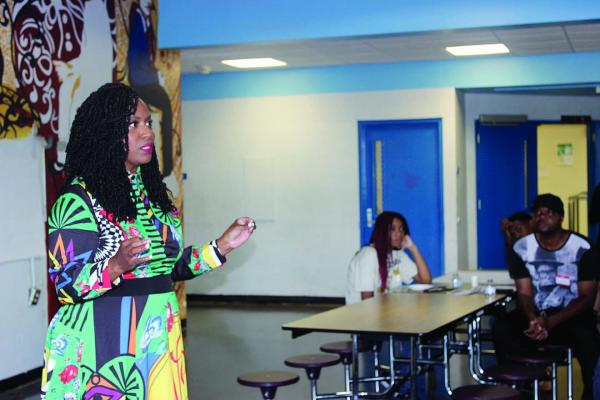August 29, 2019

Rep. Pressley addressed constituents at English High on Monday evening. Katie Trojano photo
Congresswoman Ayanna Pressley on Monday night asked her constituents to “share real life experiences” at a round- table discussion in Jamaica Plain on the topic of housing equity. The “Equity Agenda Series” meeting was one of several she plans to host in the Seventh Congressional District to help her work up legislation to address what she calls “inequalities” in housing.
Pressley has been outspoken in her opinion that housing for all is a fundamental right and that the lack of affordable housing is a public health issue. At the Monday session in the cafeteria of Boston English High School, she said that 7 out of 20 of the bills she has introduced in Congress were directly informed by information and lived experience narratives from constituents in past round table events.
“We will take what we learned here today from you and that will become the foundational floor for the legislation that I’m writing,” Pressley said, “The work that many of us have already done at a micro level in the community, state, and municipal levels, we can now partner to address these inequalities on a macro level.”
Attendees were split into several smaller groups where they discussed issues or shared personal stories about homelessness, evictions, tenants’ rights, homeownership, student debt, and creating and sustaining affordable housing. Event facilitators answered constituents’ questions and pushed the conversations along.
At one table, a group of women discussed low-income housing vs. mixed-income housing, the Family Self Sufficiency Act, and displacement. On the subject of building affordable housing, the facilitator asked the women how they feel about zoning.
“I think in general— philosophically, it’s a bad idea,” said group member Ginne Marcotte, “but I can also see in some cases why it has to happen.”
Others agreed, saying they could understand why zoning would be used to block placing an industrial waste plant next to a school while also acknowledging that zoning has been used to limit people from access to certain types of housing.
As the groups reconvened, several issues stood out as key to progress to housing equity: Holding developers accountable for providing affordable housing; the importance of sharing individual narratives; and a desire for more accurate median-income measurements.
“I’m leaving here feeling so hopeful,” Pressley said, “I’ve heard a lot here tonight in favor of a bipartisan infrastructure, and we are fighting to expand the definition to include housing.”
She concluded the conversation by urging those in the room to continue engaging in civic discussions and to participate in the 2020 census, noting that “70 percent of Boston is in the Massachusetts 7th. Out of the 100 largest cities in the country, Boston ranks ninth in being the hardest to count,” she added.


